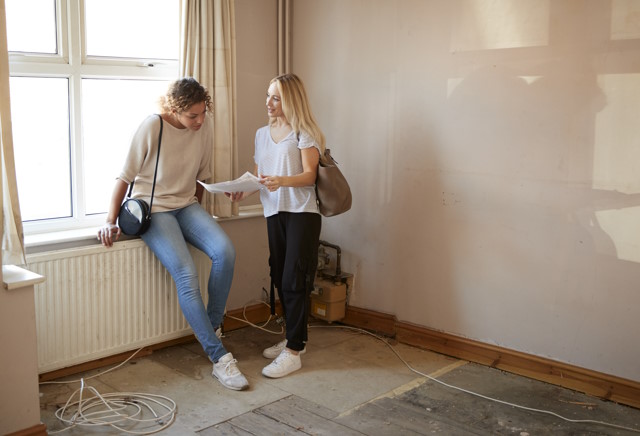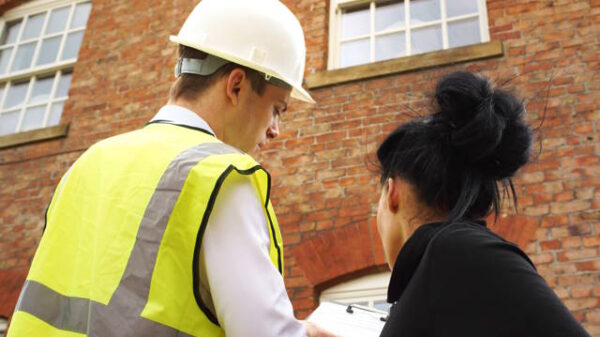Getting on the property ladder is becoming harder and less affordable, and some people are all but giving up on the dream of owning their own property.
For many it seems that unless you have a wealthy parent or benefit from an inheritance, buying your own home is a pipe dream.
Which is why people are exploring alternative ways of purchasing a property, such as buying a home with a friend.
This can be a great way to pool your resources and start building equity instead of pouring your hard-earned cash down the rental drain.
However, it’s important to consider the pros and cons of buying a home with a friend before taking the plunge to avoid potential difficulties further down the line.
Buying a house with a friend
Purchasing any property is a major decision that requires careful consideration of various factors, including financial stability, long-term commitment, and personal preferences.
In recent years, buying a house with a friend has been an emerging trend in the property market as home have become less affordable in real terms, and is a great way to share the financial burden and enjoy the benefits of co-ownership.
But it’s not a decision you should take lightly, even though it may be the only realistic way you have of buying a home.
So, let’s explore the pros and cons of buying property with a friend.
The pros of buying a house with a friend
Financial advantages
Pooling resources with a friend can make homeownership more affordable, while for many it’s the only way they can enter the property market.
The combined income and shared expenses, including mortgage payments, utilities, and maintenance costs, can significantly reduce the cost of property ownership and make it easier to secure a mortgage loan.
It also creates a greater safety net if something were to go wrong with the property, i.e. the boiler breaks down and needs replacing.
Increased buying power
Co-buying a house with a friend can increase purchasing power for both of you, meaning you can access a wider range of properties, which could potentially make a better long-term investment.
This is especially beneficial in competitive housing markets, where finding an affordable home can be challenging for individual buyers.
Shared responsibilities
As I’ve already mentioned, with a friend as a co-owner, responsibilities like property maintenance, repairs, and upgrades can be divided, reducing individual workloads and potentially lowering costs.
Sharing the workload ensures that both parties have ample time for personal commitments while maintaining the property’s overall upkeep.
Emotional support
The emotional support provided by a trusted friend during the home ownership journey can alleviate the stress and anxiety that can sometimes come with buying a house.
Sharing the highs and lows of the process can foster a supportive environment, making the experience more enjoyable and fulfilling.
The cons of buying a house with a friend
Financial risks
Entering into a joint mortgage agreement binds both you and your friend legally and financially.
If the person you’ve bought with faces financial difficulties or defaults on mortgage payments, you may be held responsible.
It’s crucial to consider the financial stability and reliability of a friend before committing to such an arrangement.
After all, if your friend is unable to make their payments and you can’t bail them out this could potentially impact both your credit scores and ultimately lead to the loss of the property.
Potential conflicts
Even the strongest friendships can experience strains when faced with financial matters.
Differences in financial goals, spending habits, or property-related decisions can lead to disagreements, potentially straining the friendship.
Clear communication, shared values, and a strong foundation of trust are essential for resolving conflicts and maintaining a healthy co-ownership relationship.
Selling conflict
One of the major sources of conflict in any joint home ownership arrangement is when one person decides they want to sell but the other doesn’t want to.
This can happen for all manner of reasons, such as relocating for a job or meeting a partner who you want to buy a property with.
Also, conflict can arise because one party doesn’t believe it’s a good time to sell due to the current property market conditions.
It’s important to set out and agree on how you’ll tackle these scenarios if they arise before you buy a property with a friend.
You can do this by creating what’s called a cohabitation agreement.
This is a legally binding document which covers a range of fine details and eventualities, such as the share of the property each of you will own, what happens if one of you wants to sell, how disputes will be settled and how bills will be paid.
One thing to remember is that it can also be extremely difficult to sell a property that you’ve bought with a friend if the other party in the agreement doesn’t want to, especially if they contest the sale.
Limited Control
In a joint homeownership arrangement, decision-making must be shared.
This can be challenging if both parties have diverging opinions on property-related matters such as renovations, maintenance, or future plans.
It is crucial to establish clear guidelines and a decision-making process to avoid disputes.
Also, it can be mentally exhausting having to discuss every minor decision involved in running and maintaining a home.
Dependency
Co-ownership can create a level of dependency on the other party.
If one co-owner wishes to sell their share or move out, it can complicate the situation, potentially requiring the sale of the property or finding a new co-owner.
Flexibility and open communication are key to navigating such situations effectively.
Conclusion
Buying a house with a friend can be a great option for achieving your home ownership goals, but it comes with some drawbacks as well.
You should carefully weigh up the pros and cons and have an in-depth discussion with the person you’re planning to buy with to ensure you’re on the same page.
Creating and signing a cohabitation agreement which outlines how you’ll approach the various eventualities that may arise is essential.
It’ll will certainly help resolve any disputes between the two of you if they arise.
It’s also important to ensure that you both have a will in place as this will establish what happens to your share of the property if you were to die.
If you die without a will, your share will effectively be in the hands of the state, although under the Intestacy Rules it’ll likely be passed to a family member (assuming you have one).
Successful co-ownership requires open communication, trust, and a solid foundation to your friendship.
However, you may want to seek legal advice before committing financially to ensure you are happy moving forward with the arrangement.
Related link: How to buy a house without a mortgage











